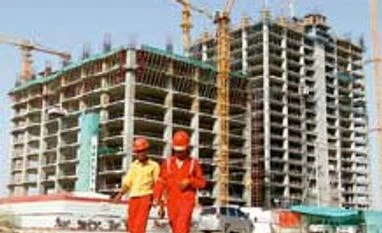According to experts, developers and brokers, this festive season saw the worst period after the global recession struck in 2008-09. Instead of high demand and blockbuster sales characteristic of the period, developers had to resort to freebies and discount schemes to lure customers. And yet, the season, which normally accounts for as much as 25 per cent of the total annual sales of houses, remained sluggish.
"This has been one of the worst years in the realty sector… sales are down, inventory is high and prices have peaked," says Pankaj Kapoor, managing director, Liases Foras, a real estate research firm. "There is a wide gap between affordability and pricing, which is why sales are not happening. There is no oversupply. It is just that supply has out-priced consumers."
Also Read
The feeling among developers is similar. "The overall sentiment is weak," says the chief executive officer of a north India- based real estate company. "The last period which was also the worst for the industry was in 2008-09 when global recession kicked in." And, he adds, "Nothing will change before the general elections in 2014. This time, domestic factors are taking a toll on the industry."
Of course, there are other developers who gamely try to ignore the disappointments of the festive season. Pradeep Jain, chairman of Parsvnath Developers, says, "We normally do not expect any big sales in the festive season. People are busy, even we are busy with family engagements. So, there is less of movement in the business." DLF's Ashok Tyagi, the chief financial officer, reiterates this: "One does not buy a home on Dhanteras … it is not gold. Clearly, we didn't have a big launch this Diwali and more so, we had no inventory to sell. We do not focus on festive season per se."
Yet the fact remains that the scenario in 2013 was bleak. New property launches in the residential segment across cities declined 12 per cent in the year, with Chennai recording the sharpest drop at 39 per cent, followed by the National Capital Region at 33 per cent and Pune at 20 per cent, according to a report by Cushman & Wakefield. Mumbai recorded just 6 per cent growth in launches.
The absorption for the January-September 2013 period declined by over 11 per cent, according to the data provided by research firm PropEquity. Out of the committed supply for this year, only 46 per cent was delivered till September.
Inventory had never earlier been as high as this year. At the end of the second quarter this year, says a Liases Foras report, the Mumbai Metropolitan Region had an inventory of 58 months, NCR 41 months, Hyderabad 32 months, Pune 31 months and Bangalore 30 months. (Inventory denotes months required to clear the stock at the existing absorption pace. A healthy market maintains eight months of inventory.)
The year 2013 has been a challenging one for both developers as well as buyers and investors. "The rising prices of land and higher cost of construction made the cash-strapped developers control their new launches and look forward to better sales and the increasing inflation and interest cost made the buyers wait and watch for price correction. Even investors had a hard time exiting their investments," says Sameer Jasuja, founder and CEO, PropEquity.
Though there are some signs of a revival in the market, it will take two to three quarters before the market stabilises. According to the latest Residex, or price index, of the National Housing Bank, prices of residential properties in around 12 cities, including Mumbai, Hyderabad and Chennai, have shown an increase during July-September over the previous quarter of this year.
However, in the April-June quarter 2013, as many as 22 cities including Delhi, Mumbai, Pune, Bangalore and Chennai, saw a fall in prices after a gap of almost two years. Experts had explained this at the time as arising from developers resorting to price cuts to spur demand.
There, however, is a paradox of sorts. While the sector's growth hinges on rising prices, buyers will be deterred by higher costs. "The revival of the sector requires actual price corrections. There is inability to purchase among buyers," says Kapoor. "The economy has to improve. But, it will take about two-three more quarters."
Jasuja of PropEquity says, "As of today, prices already stand corrected. With all the discounts, negotiations, and controlled new launches, the developers are trying to make both ends meet. Further correction can be expected in certain segments in a few locations. But overall, any downward trend across the board looks unlikely." Sanjay Sharma of Qubrex, a real estate consultancy, adds, "There has been no substantial increase in prices in the last six months or so, but if the negative sentiment continues, there will be room for price corrections."
In an attempt to build their image, developers, whose credibility has been hit by delay in deliveries, have been focusing on advertisements this year. "Property and real estate witnessed 30 per cent growth in TV advertising during January-June 2013 in comparison to January-June 2012," data by Television viewership measurement agency (TAM) show.
Perhaps the spiel will hit its mark. For, experts say that this is indeed the right time to buy a property. Says Rahul Gaur, CMD of BRYS Group, a new real estate company: "From the buyer's point of view, it makes sense to buy even with the higher prevailing interest rate due to two reasons: one, prices across the major markets have bottomed out, and two, Reserve Bank of India's tough measures to tame inflation mean interest rates will not come down in the next one year at least. So, any expectation of a price crash or correction is an argument that defies merit."
)